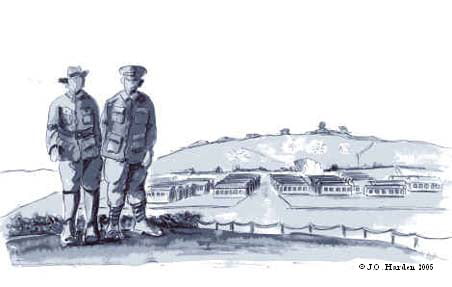
Leisure in the Camps
Entertainments
There were touring Concert Parties, which ranged from the talented amateur to professionals. But there were many talented men among the forces and their own concerts were well received. They tended towards the ribald and irreverent. One such at Fovant Camp is quoted in T.S. Crawford’s book ‘Wiltshire and the Great War’. It was first reported in ‘The Castironical’, the magazine of the 6th Bn. City of London Rifles.
‘”Jillo” the new revue at the Fovant Olympia, is an immense success. The show features several famous comedians and an entirely new set of swearwords. (Vocabulary supplied with programme.) Messrs. Hadley and Stenner, contortionists and twisters with their troupe of Derby Dandies, presented a weird eccentric dance of the Salome type. Vivacious Vivien-Wood, (a Lance Corporal in D Company) the popular comedienne, has a part which suits her exactly, and her song ‘The Reason Why I Throw My Weight About” was well received.’
Another, written by Bernard Livermore in ‘Long’un – A Damn Bad Soldier’
‘Unless Night Ops appeared on the Orders Board we spent our evenings lounging round the village (Fovant), finishing up with visit to the West Canteen… Sometimes we had an “official” Concert Party in the Village Hall. At one of these, a youngster, wearing a battered bowler hat squashed on his curly black hair and flourishing a whangee cane, gave a superb imitation of Charlie Chaplin He could also put across a comic song better than most.’ He goes on to tell how he wrote some extra verses for a song telling of incidents in camp life, which he later heard, sung in Ismailia by someone else. ‘I wrote that’ he said. ‘Go on! Bet you never did because ol’ Sam Mayo sings it; always brings the house down.’
Jack Duffell (Soldier Boy by Gilbert Mant ) records his impressions of one concert party that came to the camp at Hurdcott.
‘Some were cheered and some were counted out, but everyone seems to take it in good part. I’m hanged if I know why the people stick to the Australians for they soon let everybody on the stage know if they are not pleasing them.
Last night four girls came to give us a show and an old chap came to look after them. He was not supposed to be in the business but when the boys spotted him (a non-starter) they started yelling “Come on Dad, let’s have little bit of rag”. The old chap smiled and said he was not attached to the concern, but they would not have anyone else sing until Dad had a try. So in the finish he said “Well, boys seeing you axed me I will do my best”. He made a terrible mess of his songs but the mob cheered and clapped him on twice and it just about knocked all the wind out of him.’
The Australians had a concert party of their own called The Kangaroos that ‘toured’ to other camps and even to the New Theatre in Salisbury.
Sport
All sorts of sporting activities were encouraged not only to keep the men fit, but also to pass time. Friendly rivalry was evident in many different ways. The Divisional Cup for soccer still has pride of place in Accrington after being won outright by the East Lancs.
There was a special medal struck for a sports day held on ANZAC Day (April 25th) 1918. A photo of the one won by Pte B.J. Conlon can be seen on the Australian War Memorial Museum website. The obverse has the ‘Rising Sun’ badge in relief surrounded by the words ‘2nd Training Brigade A.I.F. Fovant’. Pte Bernard Jack Conlon served with the 38th Battalion and was killed in action on Sept 29th 1918 aged 22 years.
The Southern Counties Cross-Country Assoc. held a four and a half mile race at Fovant on June 28th 1916 contested by 42 teams including 4 from the Rifles (3rd Queen Victoria’s Rifles, 3/9th London Regiment) – A Coy won. The Rifle’s cricket team also successfully played other companies, and also at Compton Chamberlayne and Wilton Park. (T.S. Crawford in a letter).
There are photos showing everything from sack races to blindfold boxing, with many civilians enjoying the sight. Tennis courts were built and football teams had local support. The YMCA huts were used for billiards, darts and other indoor activities. (Photos of these activities can be seen on the Australian War Memorial Museum website.) When Hurdcott Camp was demolished there were five pianos and hundreds of cricket bats offered for sale.
Bands
Each Regiment had its own band who gave regular concerts to the soldiers and to the villagers.
Cinemas

There was a Cinema in Fovant in Green Drove. It was run under the direction of the Navy and Army Canteen Company, performances were twice nightly and ‘only first class pictures and programmes’ were shown. Admission prices were 3d. or 6d. or 1s. if a seat was reserved. The steps of the Fovant Camp Cinema are still in existence (2003) although a bungalow is built on the site. The bungalow is appropriately called ‘The Steps’.
There was another cinema in Hurdcott but no photograph to give us information about it.
In the minutes of the Special War Committee of the YMCA UK it was agreed to buy ‘five optical lanterns with electrical illuminations at £13.10.9 each for use by the Salisbury Plain’s YMCAs.
Click on the links below to find more information on visitors to the soldiers, poets and an unexpected aquisition for the Group:
A number of civilian visitors to the camps
Out of the Blue – A set of cartoons (but who by?)
M.A.M.
Sept. 2003

